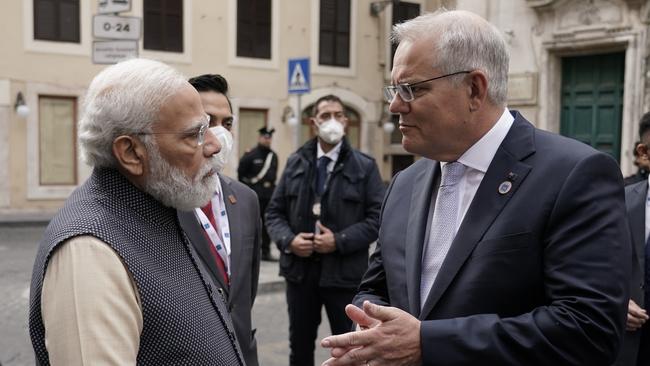
The signing of an interim free-trade agreement with New Delhi is a historic moment in the Australia-India relationship and a genuine diplomatic triumph for the Morrison government.
In substance, the deal is useful rather than revolutionary. Some $12bn of Australian exports become 85 per cent tariff-free straight away. Services exports are guaranteed equal treatment with whatever is the best deal India does with another country.
But the real importance of the agreement lies in its signalling function. It is a signal for future investment, and it’s a profoundly important geostrategic signal.
Investment should be the real lifeblood of the Australia-India economic relationship. India is a huge market, the fastest-growing big economy in the world and destined to become the world’s third-largest economy. But it is still internally focused and it’s a difficult market for exports, apart from commodities, from a nation such as Australia.
But the underlying investment opportunities in both directions are enormous.
Australian business finds the Indian market and legal system challenging. But we are in no position to deliver lectures, given the grotesque and utterly ridiculous water torture to which we subjected the Adani mine, India’s biggest investment here.
Through permanent immigration, students and two-way tourism, the people-to-people relationship has grown exponentially. Indian culture, cuisine, spirituality, movies, literature and more are now an essential part of the Australian mainstream.
But it is in geopolitics that the two nations have most recently drawn close, and for which this agreement offers the most important signal. India is the world’s largest democracy and while imperfect, like everyone else, it takes its democracy seriously. Even more important, India is the natural balancer to China in the Indo-Pacific, indeed in the world.
Just by expressing its own strategic personality, by insisting on policing its own borders and protecting its own key national interests, India provides a balance to China, incidentally as it were, and a lot of headaches for Beijing policymakers. No one can “play the Indian card”. India plays its own cards. But Indian national success, of its nature, resists Beijing’s hegemony and balances Chinese influence.
That the government of Narendra Modi has declined to offer public criticism of Russia’s invasion of Ukraine shows that its strategic identification with its Quad partners – Australia, the US and Japan – is not comprehensive. While disappointing, this is to some extent understandable. India depends heavily on Russia for hi-tech weaponry. That in itself represents a failure of American diplomacy and statecraft, a failure for the Americans to become India’s preferred arms supplier.
This failure in the US/India relationship reflects a larger failure in the US imagination. As others have argued, Washington needs to discourage friendly nations from buying Russian defence kit – and thus becoming hostage to Russian geopolitical influence – not only through negative sanctions but through positive enticements.
The high costs, long delays and bureaucratic complexity involved in buying US arms help keep nations such as India hooked up with Russia. That does not serve the interests of the US, India or Australia.
Meanwhile, at a time when Beijing continues to excoriate Canberra, New Delhi seeks and proclaims closer relations with Australia.
That’s a gesture of solidarity, and good news in anybody’s book.



